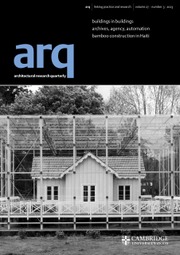Article contents
Spatial agency: tactics of self-organisation
Published online by Cambridge University Press: 12 November 2009
Extract
This paper sets out to introduce the notion of self-organisation in spatial, social and political terms, as a form of spatial agency in response to issues of subjectivity and the politics of urban space. Self-organisation – a complex notion, with multiple and sometimes contradictory meanings and implications – has gained increased relevance in contemporary political and urban discourses. In this sense, self-organisation can be understood as ‘a collective process of taking on political functions and addressing tasks that have been excluded from the field of real politics or pushed out of public space’. This reading is representative of the view taken here, particularly in its (perhaps unintentional) conflation of the political and the spatial. Indeed, the political functions that it speaks of are also, for this paper, spatial functions; and the field of politics, is also the field of architecture and urban planning.
- Type
- theory
- Information
- Copyright
- Copyright © Cambridge University Press 2009
- 1
- Cited by


